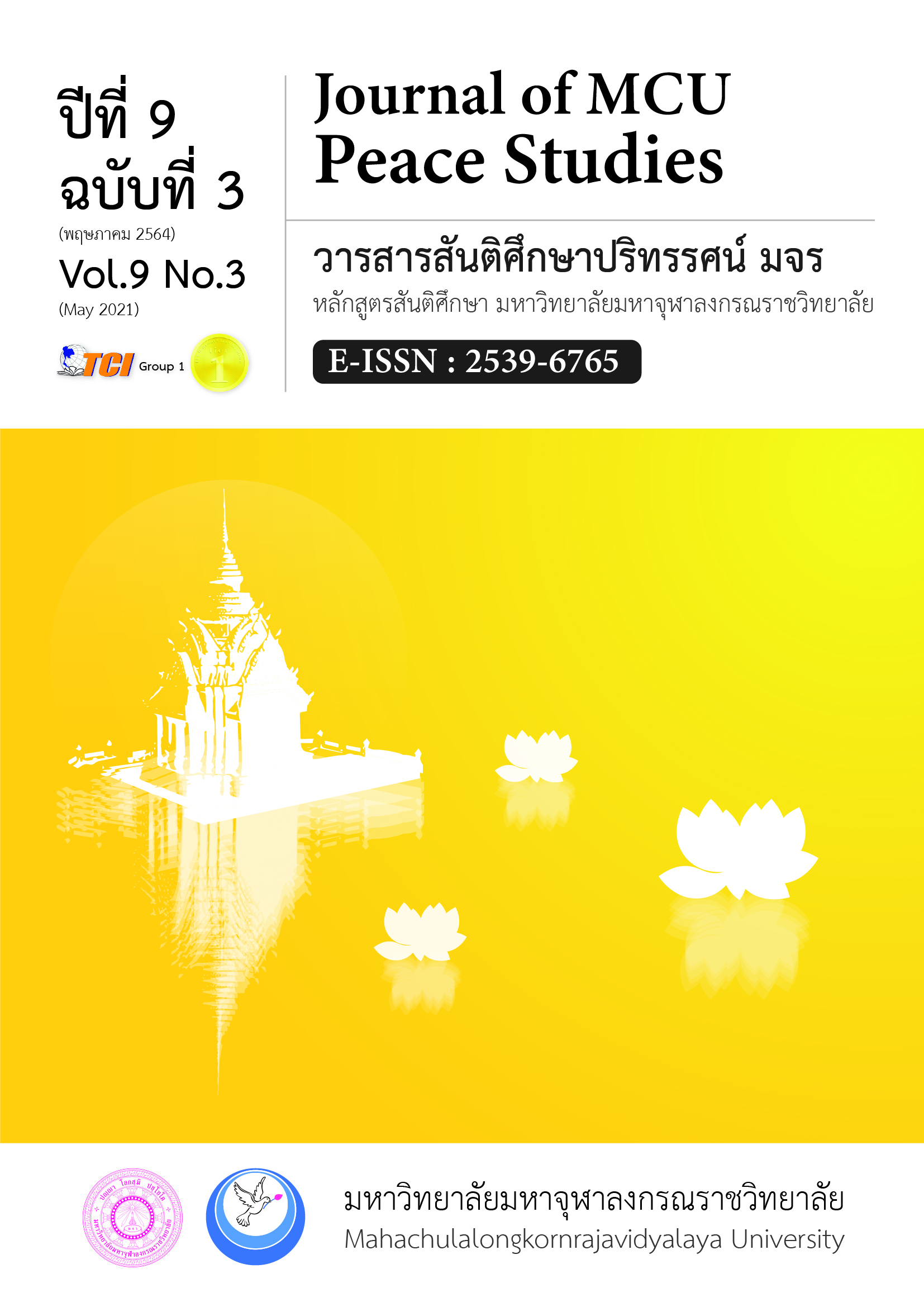การวิเคราะห์งบกำไรขาดทุนฐานร่วมของผู้ประกอบอาชีพ จำหน่ายอาหารในกรุงเทพมหานครเพื่อสร้างโอกาสในการขยายธุรกิจ
Main Article Content
บทคัดย่อ
บทนำวิถีชีวิตแบบสังคมเมืองมีพฤติกรรมการบริโภคอาหารนอกบ้านที่มีมากขึ้นจากข้อจำกัดบางประการ เช่น ไม่มีเวลา ไม่มีพื้นที่ทำอาหาร ต้องใช้เวลาในการเตรียมวัตถุดิบ ส่วนผสม ไม่ชอบการทำความสะอาด หลังทำอาหาร ทำเองไม่อร่อย บทความวิจัยครั้งนี้มีวัตถุประสงค์ 1) เพื่อศึกษาผลการดำเนินงาน วิเคราะห์งบกำไรขาดทุนฐานร่วมของผู้ประกอบอาชีพจำหน่าย ในกรุงเทพมหานคร 2)เพื่อนำเสนอแนวทางให้ผู้ประกอบอาชีพจำหน่ายอาหารในกรุงเทพมหานครเพื่อสร้างโอกาสในการขยายธุรกิจ เป็นการวิจัยเชิงคุณภาพโดยการทบทวนข้อมูลที่ได้จากเอกสาร มาตรฐานการบัญชีและงานวิจัยที่เกี่ยวข้อง เพื่อนําใช้ประกอบกับการวิเคราะห์ข้อมูล มีเครื่องมือในการวิจัยคือแบบสัมภาษณ์แบบกึ่งโครงสร้าง ใช้การสัมภาษณ์เชิงลึกกับผู้ประกอบอาชีพจำหน่ายอาหารจำนวน 4 ประเภท ได้แก่ ก๋วยเตี๋ยว ข้าวจานเดี่ยว อาหารอีสานและอาหารตามสั่ง ประเภท ละ 10 คน รวม 40 คน ที่เป็นเจ้าของธุรกิจ วิธีเลือกผู้ให้ข้อมูลใช้แบบเจาะจง เขตต่าง ๆ ของกรุงเทพมหานคร นำเสนอ ผลสถิติแบบเชิงพรรณนา ผลการวิจัยพบว่า 1) ผลการดำเนินงานจากการประกอบอาชีพจำหน่ายอาหารอีสาน มีกำไรเฉลี่ยต่อวันสูงสุดจำนวน 5,965 บาท รองลงมา คือ อาหารข้าวจานเดียวจำนวน 3,466 บาท อาหารตามสั่งจำนวน 2,352 บาท และอาหารประเภทก๋วยเตี๋ยว มีกำไรเฉลี่ยต่อวันน้อยที่สุดจำนวน 1,685 บาท การวิเคราะห์งบกำไรขาดทุนฐานร่วมเฉลี่ยต่อวันจากการประกอบอาชีพจำหน่ายอาหาร พบว่าอาหารประเภทข้าวจานเดี่ยวทำกำไรเฉลี่ยต่อวันสูงสุด ร้อยละ 49.73 รองลงมา คือ อาหารอีสานร้อยละ 43.13 อาหารตามสั่งร้อยละ 40.78 และอาหารประเภทก๋วยเตี๋ยว มีกำไรเฉลี่ยต่อวันน้อยที่สุดร้อยละ 36.38 2)แนวทางให้ผู้ประกอบอาชีพจำหน่ายอาหารในกรุงเทพฯ เพื่อสร้างโอกาสในการขยายธุรกิจ สิ่งที่ผู้ประกอบการต้องคำนึงถึง ประกอบไปด้วย 1) เวลาในการบริโภค 2) คุณภาพและรสชาติของอาหาร 3) สุขอนามัยของร้านอาหาร 4) การบริการลูกค้าสัมพันธ์ และ 5) 8 องค์ประกอบของศักยภาพผู้ประกอบการธุรกิจร้านอาหาร
Article Details
ทัศนะและความคิดเห็นที่ปรากฏในบทความในวารสาร ถือเป็นความรับผิดชอบของผู้เขียนบทความนั้น และไม่ถือเป็นทัศนะและความรับผิดชอบของกองบรรณาธิการ ยินยอมว่าบทความเป็นลิขสิทธิ์ของวารสาร
เอกสารอ้างอิง
Atawongsa, S., & Sattayarakwit, S. (2014). "The Effects of Entrepreneurial Orientation and Enterprise Characteristics on Thai Small and Medium Enterprises’ Growth." SUTHIPARITHAT Journal, 28(85), 1-79.
Boonchouy, N. (2017). he Study Cost and Returns of planting Cultivated Banana in Tha Yang District, Phetchaburi Province.Veridian E-Journal, Silpakorn University, 10, 1884-1894.
Dham, K., & Panmanee, P. (2017). Predictability of Past Firms’ Performances for Future Earnings. Nida Development Journal, 57(3), 77-99.
Department of Business Development. (2018). Statistics of the number of restaurant businesses in Thailand in 2017. Ministry of Commerce. Retrieved May 8, 2020, from http://www.dbd.go.th/download/document_file/Statisic/2560/T26/T26_201703.pdf.
Greenberg, R., Johnson, G., & Ramesh, K. (1986). Earnings versus cash Flow as a Predicator of Future Cash Flow Measures. Journal of Accounting, Auditing and Finance, 1(4), 266-277.
Kasikorn Research Center. (2016). SME adjusting strategy for restaurant business trend in the second half of the year. Bangkok: Kasikorn Bank.
Lim, S. (2009). Entrepreneurial Orientation and The Performance of Service Business. Retrieved March 7, 2020, from http://www.decisionsciences.org/Proceedings/DS12008/docs/392-9586.pdf.
Lee, et al. (2016). “Innovation, entrepreneurship, and restaurant performance: a higher-order structural model.” Tourism Management, 53, 215-228.
Peeraphatchara, J. et al. (2018). Potential Development Model for Entrepreneurs in Restaurant Business, Journal of Social Communication Innovation, 6, 2(12), 165 -176.
Promjui, S. et al. (2017). Education in promoting independent occupations for earning income while studying in secondary schools.TOU Education Journal,11(1), 252-267.
Sektrakul. K. (2013). Financial Statement Analysis. Bangkok: Capital Market Knowledge. Development Promotion Center; The Stock Exchange of Thailand.
Pattaphong, D. (2015). Academic papers of business administration. Retrieved May 20, 2020, from http://it.nation.ac.th/faculty/danai/download/mbamadeeasy68.pdf.
Ratnithipong, T. (2011). actors affecting street - food consumption behavior of workingage consumers on Silom road. Bangkok: Srinakharinwirot University.
Sektrakul, K. (2013). Financial Statement Analysis. Bangkok: Capital Market Knowledge Development Promotion Center; The Stock Exchange of Thailand.
ThaiSMEs Center. (2020). Strategy - Open a noodle shop - Never die. Retrieved May 17, 2020, from http://www.thaismescenter.com/7-.
Thuwanimitkul. P. (2016). Corporate Finance. (6th ed.). Bangkok: Finance Department Faculty of Commerce and Accountancy Thammasat University.
Verplankan, B. (2004). Value congruence and job satisfaction among nurses: A human relations perspective. International Journal of Nursing Studies, 41, 99-605.


